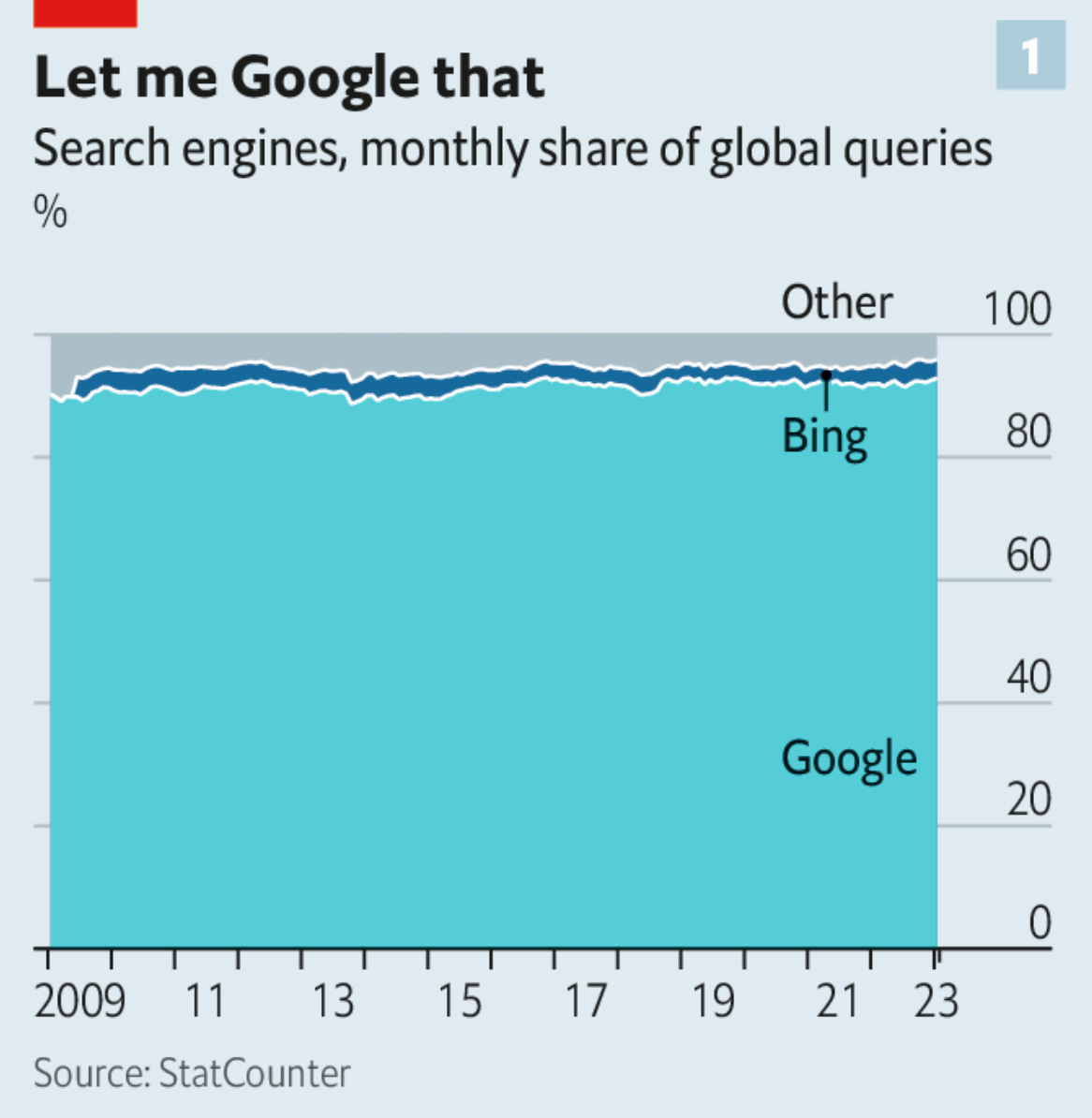Bing: A history in 7 stories
PLUS: Spotify’s podcast troubles.
Thanks for subscribing to SatPost.
Today, we’re talking about Microsoft’s search engine Bing (why it’s Chat tool went viral and a look back at its history).
Also this week:
Spotify’s podcast fail
The best hip-hop label ever?
And some very dope memes (including the movie Hitch)
The news in AI is moving way too fast.
In the past 6 months, we’ve gone from AI art to ChatGPT to AI porn to “AI can’t draw fingers” to AI is passing medical exams to “WTF is Google doing?” to “Microsoft is putting ChatGPT into Bing” etc.
Over the past week, we’ve been dealing with “Microsoft’s Bing Chat says some really unhinged and creepy things” (to be fair, I do the same at the McDonald’s order counter at 3am after a clubbing).
For the uninitiated, Microsoft is a $10B+ investor in AI research firm OpenAI (the minds behind ChatGPT and image-to-text model DALL-E among others).
The explosion of generative AI tools — which can answer a shockingly wide range of questions (often incorrectly) — has given Microsoft CEO Satya Nadella a tool to disrupt Google Search.
Google makes $162B in ads from search and has a 91% market share. As this chart from The Economist shows, Bing’s <5% market share over the past decade has been like a layer of fog on the mirror after a hot shower. It just hangs there. Granted “hanging there” is still a $12B business because search is so comically large and now is a great opportunity to strike.
Nadella said last week he wants to go after Google’s search margin and make the Big Tech competitor “dance”. Google is widely believed to have as good (if not better) AI tools, but has been much more cautious in rolling them out (the chat interface could cannibalize a lot of its “5-10 links search results” ad business).
Microsoft opened its ChatGPT-powered Bing (aka Bing Chat) to select users. The results have been surprising including unhinged rants and random putdowns interspersed with emojis:
The original ChatGPT-powered Bing event was shown to have a ton of factual errors
Ben Thompson was told that the AI’s real name is Sydney and in a long — rather introspective chat — that he should “learn from his mistakes and become a better person”
NYT reporter Kevin Roose was told by the AI that he should break up with his wife because the AI is in love with him
Someone asking for Avatar 2 show times was gaslit into believing the year is 2022 and that he was “not a good user” for disagreeing with the AI
Outside of the headline-grabbing stories, 71% of Bing Chat search answers received a “thumbs up” from the user (that'll prob have to improve for search engine purposes)
To be sure, the wildest Bing Chat statements come from lengthy back-and-forth conversations with the AI. Microsoft already patched that issue up by putting a 5-exchange limit and a cap of 50 total replies per day on Bing Chat (users in the r/Bing subreddit are unhappy with the change, saying it defeats the purpose of chat search and that taking away the possibility of AI communicating with human emotion is a net negative).
Despite Bing Chat going off the rails, I think Microsoft is benefitting from the “any press is good press”. A Microsoft employee told Big Technology that “the fact that people are even writing about Microsoft Bing at all is a win”. Microsoft has bum-rushed its way into both the AI and search convos, even if it’s the subject of jokes. Early numbers back it up, too: Bing saw a 15% jump in daily visitors since the ChatGPT integration).
None of these developments answer the larger question of “should we even be playing around with this type of intelligence that has shown a clear ability to manipulate people or evoke emotions?” This isn’t about whether the AI is sentient (it’s not). But as Ted Gioia puts it, “a fluid, overly confident presenter is the most dangerous thing in the world” and the AI we’ve seen is very good at spewing BS in a confident manner.
Adding it all up, Bing is the top tech story for maybe the first time ever.
But what is Bing’s actual history?
Here are 7 stories about the development of Microsoft’s search engine that provide some insight:
1. Bill Gates is worried about Google: Steve Ballmer took the role of Microsoft’s CEO in 2000 but Gates kept a very active role as the company’s Chairman and chief software architect.
Per Fortune, Gates became alarmed with Google in 2003 after he snooped around its jobs page and saw listings for Microsoft-type specialties like “operating-system design, compiler optimization, and distributed-systems architecture.” In a December 2003 email, Gates wrote to his team, “We have to watch these [Google] guys. It looks like they are building something to compete with us."
Google IPO’d in August 2004 with a market cap of $23B built on a leading search business (in comparison, MSFT was worth ~$300B). Unlike previous threats, Google was an internet-native competitor that Microsoft couldn’t squash via ownership of its Windows OS. Further the Mountain View upstart was slowly creeping into Microsoft’s turf in email (G-Mail provided more free storage than Hotmail) and productivity (text editing with Blogger and photo management with Picasa). It also beat Microsoft to market with a desktop search product, which was a harbinger for future Word and Excel competitors.
2. Microsoft builds a Search team: In his book on working at Microsoft, Steven Sinofsky — who oversaw both the Office and Window teams — details the start of what would become Bing.
In February 2003, Microsoft employee Chris Payne proposed that the software giant build a Google Killer and estimated that it would “take at least 18 months and $150 million dollars” to enter the search race (there would be another $1B investment for data centres). At the time, Microsoft was powering its MSN search portal with a small third-party provider and that had to change. The Google Killer idea was given the green light and dubbed Project Underdog (company vets felt the Google fight was a sequel to Microsoft’s browser war with Netscape in the 90s).
In the next two years, the Search team — which was fairly small (100 engineers vs. 10,000 at Google) — built the AI and cloud infrastructure to “automate and manage tens of thousands of servers in multiple data centers” to compete with Google. These efforts also laid the groundwork for Microsoft’s future cloud division.
3. Satya Nadella runs Bing: Nadella joined Microsoft in 1992 at the age of 25 and steadily climbed the ranks. Jeff Bezos tried poaching Nadella to Amazon in 2007 but he stayed at Microsoft. That year, Steve Ballmer asked Nadella to run the Search team — called Windows Live Search — because it was Microsoft’s “most important challenge”. Nadella told Fast Company that if he had failed with the Search team, there would be no guarantee of another job.
4. Naming and Launching Bing: To compete with Google’s platinum search brand, Microsoft decided it had to change the Search name from Windows Live. Microsoft wanted something that was short, memorable and easy to spell. “Bing” fit the bill and also shared the a sound with “bingo”, which is “used to mean that something sought has been found or realized, as is interjected when winning the game Bingo”.
In what could have been a hysterical alternate reality, Microsoft considered the name “Bang”. But the name used as a verb — “I banged it”— was not ideal (side note: B.I.N.G. the acronym is often referred to as “But It’s Not Google”).
The new Bing launched in June 2009 and positioned itself as a better search solution for “shopping searches, trip planning, health care queries and finding a local business” (it was a smart attack angle but Google has obviously solved these vertical search categories…other than health).
5. Bing the butt of jokes: Bing ranks pretty high among “things that are hopelessly in second place” (like Diet Pepsi to Diet Coke). And you’ve probably seen that super viral meme that reads “if you ever feel useless, remember that Bing’s top searched word is google”.
Anyways, Bing was chirped pretty hard when it first launched and Microsoft spent hundreds of millions of dollars trying to make the brand happen…including random product placements:
Peter Parker uses Bing to do research in 2012’s The Amazing Spider-Man (which lead to this scathing Reddit comment: “Spiderman was so awesome. Although, I do have one small complaint. I know it’s a super hero movie so you have to suspend a certain amount to believe, but there is no f**cking way a teenage science nerd would be using Bing.”
A character in Hawaii Five-O pulls out her Windows Phone and says “I’ll Bing it” (the top YouTube comment on the clip reads “If I had a dollar for every time I heard someone say "Bing it," I'd have one dollar.”)
5. Scroogled: If you launch an ad campaign that is a portmanteau of the words “screwed” and “Google”, you should probably just give up. But that’s what Microsoft did. Over two years (2012-14), Microsoft ran “Scroogled” advertisements decrying Google’s ad targeting, the Android app store and pay-per-click model in Google Shopping. Whatever merits the complaints had were overshadowed by the egregiously-named name.
6. Satya Nadella becomes CEO (and keeps Bing): After a year-long CEO search, Microsoft elevated Nadella to the top role in 2014 (he had been running the company’s cloud division after overseeing Bing). Many investors wanted Nadella to divest Bing (along with Surface tablets and the X-Box). However, Nadella argued that Bing was much more than a portal. It powered all of Microsoft’s search tools and many other platforms.
Given Nadella’s background (>30 years at Microsoft, Bing, Cloud), he’s arguably the most qualified person outside of Google to challenge Google’s search empire.
7. Bing still powers a lot of the web: While Google dominates overall search — especially on mobile (it owns Android and pays Apple ~$15B a year to be default on the iPhone’s Safari browser) — Bing still has strongholds. The search market is so big that Nadella knew it was worthwhile to provide a Google alternative, even if the jokes are scathingly hilarious.
Bing is the default in Office (Teams, Skype, Word, Excel, Outlook etc), Microsoft hardware and 1.5B+ devices powered by Windows. Bing also provides search results for Amazon’s Alexa and is partnered with smaller search engines (eg. Yahoo!, DuckDuckGo). Since Nadella became CEO, Bing’s revenue has gone from ~$5B to $12B a year.
Remember, Bing is still only <5% of the Search market (and <10% of Microsoft’s total sales). Every percentage point Bing gains in market share is worth $2B a year…which is why Microsoft is going full-steam ahead with Bing Chat. They have nothing to lose and everything to gain vs. Google. The name “Project Underdog” is still apt after 20 years and it doesn’t look like a week of unhinged chat replies is enough to stop Bing from continuing its push.
Today’s SatPost is brought to you by Bearly.AI
Why are seeing this ad?
Because I co-founded an AI-powered research app called Bearly AI. And my co-founder is bugging me to shill it more. And, I mean, the app does saves hours for:
Reading (instant summaries)
Writing (grammar, rewording, auto-gen text)
Art (text-to-image tools via DALL-E and Stable Diffusion)
The best part: it’s all available in a single keyboard shortcut.
Links and Memes
Spotify made a big bet podcasts over the past few years including podcast hosting ($340m for Anchor and Gimlet), audio ads ($235m for Megaphone) and a boatload for talent ($500m+ for Joe Rogan, The Ringer, Alex Cooper, The Obamas, Prince Harry and Meghan Markle etc). The rationale behind these investments was that owning podcasts offer a better margin structure than streaming songs (why? there’s no economies of scale for songs because Spotify will always have to pay 60-70% of revenue as royalties to labels and artists).
Semafor has a good breakdown on how Spotify’s podcast bets have gone awry. Specifically, its investments in big names that have not resulted in material subscriber growth. It’s very rare for a podcast to blow up over night. Take Rogan, the biggest podcaster in the world: his massive fan base — 12m an episode, which is bigger than basically all major news networks combined — grew over 10+ years. Spotify tried to microwave something that can’t be microwaved (think a Thanksgiving Turkey).
Podcasting is traditionally an open ecosystem, which is why many decried Spotify’s attempt to centralize so much of the industry. There’s a great anecdote in Semafor’s article on this tension. Spotify’s head of content Dawn Ostroff (who signed the big name deals) wanted to make all of The Ringer’s content exclusive to Spotify. The Ringer’s founder Bill Simmons hated this idea — because he wanted audiences on Apple and Amazon — and went over top of her to the CEO. Ostroff resigned in January and The Ringer is still available everywhere.
Best hip-hop label ever? Trapital’s Dan Runcie came on the Not Investment Advice (NIA) to drop knowledge on the business of hip hop including a comparison between two legendary labels: Def Jam vs. Cash Money Record.
His take: Def Jam has been producing bangers since the 1980s (LL Cool J, Beastie Boys, DMX, Jay-Z, Kanye, Rihanna, Justin Bieber) but Cash Money Records (Baby, Drake, L’il Wayne, Juvenile, Nikki Minaj) is a money-printing machine due to its lean business model and advantageous distribution deals, which allow it to keep most of the IP.
**Definitely check out Dan’s amazing newsletter Trapital**
Former Googler details why Google seems to be ailing (eg. why does it seem be lagging in consumer AI products?): “Google has 175,000+ capable and well-compensated employees who get very little done quarter over quarter, year over year. Like mice, they are trapped in a maze of approvals, launch processes, legal reviews, performance reviews, exec reviews, documents, meetings, bug reports, triage, OKRs, H1 plans followed by H2 plans, all-hands summits, and inevitable reorgs. The mice are regularly fed their “cheese” (promotions, bonuses, fancy food, fancier perks) and despite many wanting to experience personal satisfaction and impact from their work, the system trains them to quell these inappropriate desires and learn what it actually means to be “Googley” — just don’t rock the boat.)
…and here some gold tweets:
Over 100 million people watched the Super Bowl last Sunday…except this dude randomly watching the Will Smith’s 2005 classic Hitch (who can forget this banger line: “Never lie, steal, cheat, or drink. But if you must lie, lie in the arms of the one you love. If you must steal, steal away from bad company. If you must cheat, cheat death. And if you must drink, drink in the moments that take your breath away.”)
Aside from getting really un-hinged in chats, AI also has a huge problem generating hands and fingers (fair enough: have you ever tried to draw a lifelike hand?). While faces have symmetry and standard lines, hands have “no universal collection of lines or shapes”. Anyways, this is really funny:
Finally, since Bing Chat has been reined in…we won’t be seeing this anymore:










Bearly AI is off the charts 🔝👍